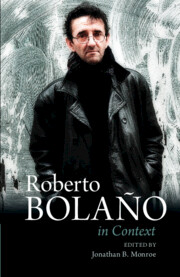Book contents
- Roberto Bolaño in Context
- Roberto Bolaño in Context
- Copyright page
- Contents
- Contributors
- Chronology
- Part I Geographical, Social, and Historical Contexts
- Part II Shaping Events and Literary History
- Part III Genres, Discourses, Media
- Part IV Aesthetics, Culture, and Politics
- Chapter 23 The Abomination of Literature
- Chapter 24 Religion and Politics
- Chapter 25 Gender and Sexuality
- Chapter 26 Race and Ethnicity
- Chapter 27 Trauma and Collective Memory
- Chapter 28 Fictions of the Avant-Gardes
- Chapter 29 Love and Friendship
- Chapter 30 World Literature: Twenty-First-Century Legacies
- Further Reading
- Index
Chapter 27 - Trauma and Collective Memory
from Part IV - Aesthetics, Culture, and Politics
Published online by Cambridge University Press: 15 December 2022
- Roberto Bolaño in Context
- Roberto Bolaño in Context
- Copyright page
- Contents
- Contributors
- Chronology
- Part I Geographical, Social, and Historical Contexts
- Part II Shaping Events and Literary History
- Part III Genres, Discourses, Media
- Part IV Aesthetics, Culture, and Politics
- Chapter 23 The Abomination of Literature
- Chapter 24 Religion and Politics
- Chapter 25 Gender and Sexuality
- Chapter 26 Race and Ethnicity
- Chapter 27 Trauma and Collective Memory
- Chapter 28 Fictions of the Avant-Gardes
- Chapter 29 Love and Friendship
- Chapter 30 World Literature: Twenty-First-Century Legacies
- Further Reading
- Index
Summary
Roberto Bolaño’s writing emphasizes the ways exile shapes individual and collective responses to traumatic losses, which are often produced by state violence. The dispersive nature of these responses demands an approach to collective memory that resists the purported coherence of the national narrative. My analysis considers the effort to establish coherency in By Night in Chile in contrast to the calls for openness that characterize the other texts I analyze: The Spirit of Science Fiction, “Visit to the Convalescent,” and Woes of the True Policeman. In reference to discussions of memory and trauma by Adeila Assmann and Nelly Richard, my reading of Bolaño’s texts pairs a critique of authorial coherence with a critique of national coherence. I focus especially on narrative boundaries and fissures, including the motifs of holes and storms. I conclude that an open, interrelational textual analysis of a single author’s work enables a critique of that work that, in turn, strengthens a critique of national narratives and their propensity to conceal traumatic pasts.
Keywords
- Type
- Chapter
- Information
- Roberto Bolaño In Context , pp. 303 - 311Publisher: Cambridge University PressPrint publication year: 2023

